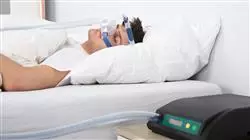University certificate
The world's largest faculty of medicine”
Introduction to the Program
The new scenarios in Sleep Medicine push us to propose new update programs that meet the real needs of experienced professionals, so that they can incorporate current advances into their daily practice"

There is a growing multidisciplinary interest in Sleep Medicine, a discipline in frank expansion, whether it is approached from a global point of view or from the "partial specialization", depending on the original health field or specific area of interest, in all cases, a rigorous and updated generic knowledge in all its fields is vital. This Postgraduate certificate' more than fulfils this objective from an eminently practical point of view. Its approach sets it apart from many other programs on this very transverse discipline, which are often criticised for being too "descriptive" and "theoretical", and therefore not entirely useful in resolving many situations that arise in clinical management.
In this program, the student will become familiar with the different techniques available, from the simplest, in which very few parameters are recorded on an outpatient basis, to the more complex tests, often necessary, which provide much more information, are more expensive and usually require hospital registration. You will acquire skills in recording, analyzing, coding and interpreting such evidence with the invaluable aid of appropriate graphical methods. It includes specific chapters on innovative techniques, such as integrated systems and chronosensors, for the study of circadian disturbances, which provide a novel approach to sleep disorders. It is also intended that the student integrates, from an organizational point of view, sleep techniques performed at the local level, in the multidisciplinary and multisectoral level, which is where sleep medicine is currently located.
With the clear objective of combining scientific evidence and practical utility, this Diploma in Technical and Organizational Aspects of the Diagnostic Process in Sleep-Wakefulness Disorders has a broad, updated and unbeatable program, prepared by a varied team of professional experts (physicians, psychologists, biologists, engineers, etc.), who provide their proven experience in the form of explanations, entertaining and clarifying practical examples, abundant graphic-audiovisual support, absolutely essential in the teaching of this thriving discipline.
In addition, this program's degree has the advantage of being developed in a 100% online format, so students will be in charge of deciding when and where to study, distributing their study hours to suit them, so that they can combine their studying with the rest of their daily commitments.
We offer a complete program for you to develop in the field of Technical and Organizational Aspects of the Diagnostic Process in Sleep-Wakefulness Disorders. Think no more and enrol with us”
This Postgraduate certificate in Technical and Organizational Aspects of the Diagnostic Process in Sleep-Wakefulness Disorders the most complete and up-to-date program on the market. The most important features include:
- Developing practical cases presented by experts in Sleep Medicine
- The graphic, schematic, and practical contents provide students with scientific and practical information on the disciplines that are essential for professional practice
- Updates on Sleep Medicine and safety
- Practical exercises, where the self-assessment process can be carried out to improve learning
- Emphasis on innovative methodologies in Sleep Medicine
- Theoretical lessons, questions to the expert, debate forums on controversial topics, and individual reflection assignments
- Content that is accessible from any fixed or portable device with an Internet connection
This Postgraduate certificate is the best investment you can make in selecting a refresher program to update your knowledge in Technical and Organizational Aspects of the Diagnostic Process in Sleep-Wakefulness Disorders"
The teaching staff includes medical professionals who bring their experience to this training program, as well as renowned specialists from leading societies and prestigious universities.
Its multimedia content, developed with the latest educational technology, will provide the professional with situated and contextual learning, i.e., a simulated environment that will deliver an immersive learning experience, programmed to train in real situations.
The design of this program is Bases Problem-Based Learning, in which, the medical professional will resolve professional practice situations that may arise throughout the program. To do so, the specialist will be assisted by an innovative interactive video system created by renowned and experienced experts in Sleep Medicine.
We offer you an interactive video system which makes it easier for you to study this Postgraduate certificate"

Our 100% online specialization and our original educational methodology allow you to combine your studies with your other daily commitments"
Why study at TECH?
TECH is the world’s largest online university. With an impressive catalog of more than 14,000 university programs available in 11 languages, it is positioned as a leader in employability, with a 99% job placement rate. In addition, it relies on an enormous faculty of more than 6,000 professors of the highest international renown.

Study at the world's largest online university and guarantee your professional success. The future starts at TECH”
The world’s best online university according to FORBES
The prestigious Forbes magazine, specialized in business and finance, has highlighted TECH as “the world's best online university” This is what they have recently stated in an article in their digital edition in which they echo the success story of this institution, “thanks to the academic offer it provides, the selection of its teaching staff, and an innovative learning method aimed at educating the professionals of the future”
A revolutionary study method, a cutting-edge faculty and a practical focus: the key to TECH's success.
The most complete study plans on the university scene
TECH offers the most complete study plans on the university scene, with syllabuses that cover fundamental concepts and, at the same time, the main scientific advances in their specific scientific areas. In addition, these programs are continuously being updated to guarantee students the academic vanguard and the most in-demand professional skills. In this way, the university's qualifications provide its graduates with a significant advantage to propel their careers to success.
TECH offers the most comprehensive and intensive study plans on the current university scene.
A world-class teaching staff
TECH's teaching staff is made up of more than 6,000 professors with the highest international recognition. Professors, researchers and top executives of multinational companies, including Isaiah Covington, performance coach of the Boston Celtics; Magda Romanska, principal investigator at Harvard MetaLAB; Ignacio Wistumba, chairman of the department of translational molecular pathology at MD Anderson Cancer Center; and D.W. Pine, creative director of TIME magazine, among others.
Internationally renowned experts, specialized in different branches of Health, Technology, Communication and Business, form part of the TECH faculty.
A unique learning method
TECH is the first university to use Relearning in all its programs. It is the best online learning methodology, accredited with international teaching quality certifications, provided by prestigious educational agencies. In addition, this disruptive educational model is complemented with the “Case Method”, thereby setting up a unique online teaching strategy. Innovative teaching resources are also implemented, including detailed videos, infographics and interactive summaries.
TECH combines Relearning and the Case Method in all its university programs to guarantee excellent theoretical and practical learning, studying whenever and wherever you want.
The world's largest online university
TECH is the world’s largest online university. We are the largest educational institution, with the best and widest online educational catalog, one hundred percent online and covering the vast majority of areas of knowledge. We offer a large selection of our own degrees and accredited online undergraduate and postgraduate degrees. In total, more than 14,000 university degrees, in eleven different languages, make us the largest educational largest in the world.
TECH has the world's most extensive catalog of academic and official programs, available in more than 11 languages.
Google Premier Partner
The American technology giant has awarded TECH the Google Google Premier Partner badge. This award, which is only available to 3% of the world's companies, highlights the efficient, flexible and tailored experience that this university provides to students. The recognition as a Google Premier Partner not only accredits the maximum rigor, performance and investment in TECH's digital infrastructures, but also places this university as one of the world's leading technology companies.
Google has positioned TECH in the top 3% of the world's most important technology companies by awarding it its Google Premier Partner badge.
The official online university of the NBA
TECH is the official online university of the NBA. Thanks to our agreement with the biggest league in basketball, we offer our students exclusive university programs, as well as a wide variety of educational resources focused on the business of the league and other areas of the sports industry. Each program is made up of a uniquely designed syllabus and features exceptional guest hosts: professionals with a distinguished sports background who will offer their expertise on the most relevant topics.
TECH has been selected by the NBA, the world's top basketball league, as its official online university.
The top-rated university by its students
Students have positioned TECH as the world's top-rated university on the main review websites, with a highest rating of 4.9 out of 5, obtained from more than 1,000 reviews. These results consolidate TECH as the benchmark university institution at an international level, reflecting the excellence and positive impact of its educational model.” reflecting the excellence and positive impact of its educational model.”
TECH is the world’s top-rated university by its students.
Leaders in employability
TECH has managed to become the leading university in employability. 99% of its students obtain jobs in the academic field they have studied, within one year of completing any of the university's programs. A similar number achieve immediate career enhancement. All this thanks to a study methodology that bases its effectiveness on the acquisition of practical skills, which are absolutely necessary for professional development.
99% of TECH graduates find a job within a year of completing their studies.
Postgraduate Certificate in Technical and Organizational Aspects of the Diagnostic Process in Sleep-Wakefulness Disorders
Are you ready to master the techniques and tools of sleep-wake disorders, acquiring technical and organizational knowledge to provide quality care to patients with sleep problems? With TECH Global University you can do it! Sleep-wake disorders affect a large number of people worldwide and can have a significant impact on their quality of life. If you are interested in helping diagnose and treat these disorders, our Postgraduate Certificate in Technical and Organizational Aspects of the Diagnostic Process in Sleep-Wake Disorders will provide you with the knowledge you need, You will study the different types of disorders, including insomnia, sleep apnea, narcolepsy and restless legs syndrome. You will learn about the risk factors, underlying causes and characteristic symptoms of each disorder.
Become an expert in evaluation and diagnostic techniques.
In this high-level Postgraduate Certificate you will study the different tests and studies used in the diagnostic process, such as polysomnography, actigraphy and sleep assessment questionnaires. In addition, you will explore how to interpret the results of these tests and make an accurate diagnosis, but that's not all! You'll learn about therapeutic options, ranging from lifestyle changes and behavioral therapies to the use of specific devices and medications. In addition, you will study how to develop personalized treatment plans and provide appropriate follow-up care to patients. The Postgraduate Certificate in Technical and Organizational Aspects of the Diagnostic Process in Sleep-Wakefulness Disorders will provide you with the knowledge and skills necessary to perform an effective diagnostic process and provide quality care to patients with sleep problems. Stand out as a trained professional in the field of sleep-wake disorders and contribute to improving the quality of life of those suffering from these disorders. Enroll now and become an expert in the diagnosis of sleep-wake disorders!







